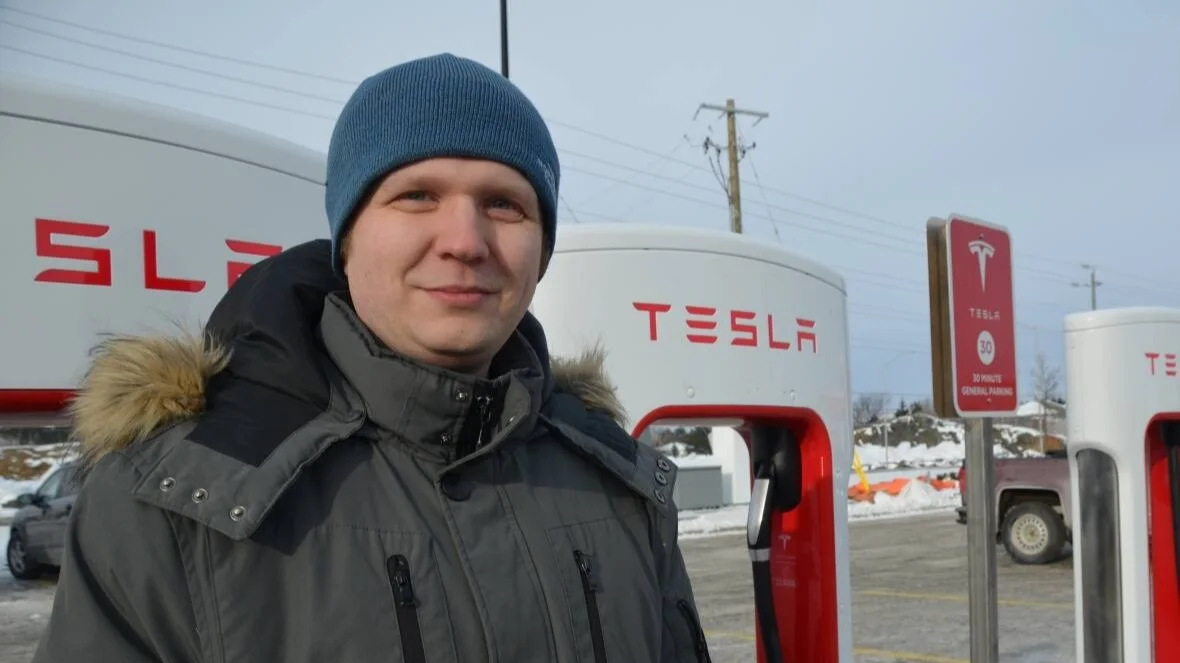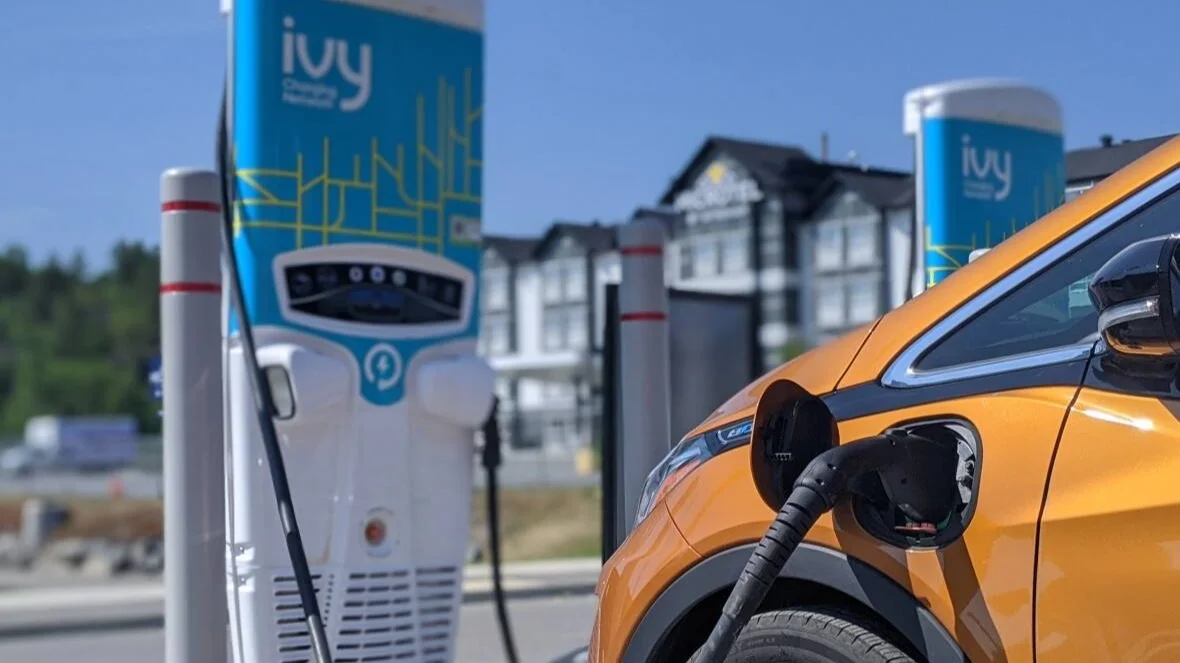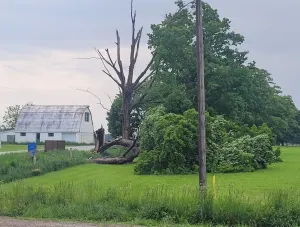
EV range anxiety a concern in northern Ontario, but charging networks improving
Jodi Podlatis has experienced first hand the range anxiety that can happen when you drive an electric vehicle (EV) in northern Ontario.
Last December, she bought an Audi Q4 e-tron electric sport utility vehicle (SUV) to save gas money on her long commute to work and reduce her personal carbon footprint.
"Our family has been very interested in our carbon footprint and we are very conscious of supporting sustainability," she said.
"We were very motivated to purchase electric vehicles."
Podlatis lives in Massey, Ont., and drives around 95 kilometres east to get to work in Sudbury.
On her way home, there's only one fast EV charger that works with the CCS system found in her car.
"I came to Sudbury and on my way home, because I had done some errands," she said.
"I needed to charge up in Espanola and I got there, and the charger didn't work."
The battery in her car was nearly dead, but Podlatis said she took the risk and drove the rest of the way home. She just barely made it there, an experience that made her more cautious about the range of her SUV.
Lacking infrastructure
For people who regularly drive long distances, Podlatis believes the charging infrastructure in northeastern Ontario is inadequate.
Manitoulin Island, for example, doesn't have a single Level 3 charger with speeds of 50 kW or more, which can charge a car in an hour or less.
"One of the things that I found ironic is that when I purchased my car, it came with free two years charging at Electrify Canada stations," Podlatis added.
"There's no Electrify Canada stations north of Barrie."
Her son drives a Tesla Model Y, and she said his experience has been better. Tesla has its own charging network and standard, and Podlatis said her son has found it to be more reliable than the CCS charging stations she uses.
But despite her range anxiety scare, Podlatis said she doesn't regret buying an EV as a way to reduce her carbon footprint and support the local economy, since critical minerals from northern Ontario, like nickel, are key components of EV batteries.

Devin Arthur, president of the Greater Sudbury Electric Vehicle Association, stands at a Tesla charging station on Long Lake Road in Sudbury. Arthur says insufficient fast-charging infrastructure is still a concern north of Sudbury, but less of an issue to the south. (Erik White/CBC)
Devin Arthur, president of the EV Society in Greater Sudbury, said insufficient fast-charging infrastructure is still a concern north of Sudbury, but less of an issue to the south.
Arthur said one advantage of EVs, though, is most people only need to access public chargers if they're on a road trip or away from home for a longer time.
As of the first quarter of 2023, there were 307 registered EVs in Sudbury and another 247 plug-in hybrids that run on an electric motor for a short time before they switch to a gas engine.
Arthur estimates 98 per cent of those owners are set up to charge their cars at home overnight.
"You're always starting the day off with that full 'tank of gas,'" he said.
"It's a mind shift to get people their heads wrapped around that they don't need to rely on those stations as often as you would a gas station."
WATCH BELOW: Why this ski region wants to electrify the 'Powder Highway"
Most EV owners charge at home
Across the country, more than 90 per cent of EV owners are able to charge their cars at home, said Daniel Breton, president and chief executive officer of Electric Mobility Canada, an industry association that represents the EV sector.
Breton said after early adopters get EVs, the big challenge will be to ensure people living in apartments and condos have access to home charging.
While some rural parts of Canada still lack fast-charging infrastructure, he said that's an easier problem to solve.
Breton said there are around 20,000 public EV charging stations in Canada right now, and the country is on track to reach 50,000 by 2025.
Quebec and British Columbia, he said, are ahead of Ontario for the deployment of fast chargers.
Even in more rural parts of Quebec, such as the Gaspésie region, fast chargers are more plentiful than they are in northern Ontario.
Breton said one reason for that head start is that Hydro-Québec has built out its Electric Circuit network, which includes 4,200 charging stations, of which 700 are fast chargers with speeds of 50kW or higher.

Michael Kitchen, general manager of the Ivy Charging Network, says it's on track to have more than 150 fast chargers across Ontario by the end of the year. (Submitted by Devin Arthur)
In comparison, Ontario's Ivy Charging Network, owned by Ontario Power Generation and Hydro One, is on track to have more than 150 Level 3 fast chargers and 32 Level 2 chargers across the province by the end of 2023.
Michael Kitchen, the Ivy Charging Network's general manager, said the cost to install charging stations depends on several factors, including the location and speed of the charger.
Level 3 fast chargers tend to be in the "six-figure range," he said, while the slower Level 2 chargers are much cheaper to install.
Kitchen said they have 16 charging locations in northern Ontario, including in Sudbury, North Bay, Sault Ste. Marie and Thunder Bay.
"We're constantly monitoring the network," he said.
"If the charger goes down, we try to troubleshoot it remotely. If we're unable to do that, then we will look to open a service ticket with the hardware manufacturer and look to dispatch our maintenance team as quickly as possible to be able to resolve the issue."
While the move to EVs — and building out charging networks — is still in its infancy, a recent survey from the Canadian Automobile Association (CAA) found concerns around range anxiety diminish with EV ownership.
In March, the CAA surveyed 16,232 EV owners across Canada.
Before owning an EV, 67 per cent of the people surveyed said they were concerned they would not have enough driving range and 66 per cent were worried there wasn't enough public charging infrastructure available.
"After owning an EV for a period of time, those numbers dropped to 30 per cent worried about range and only 44 per cent about public charging," said Julie Beun, CAA's director of communications for northern and eastern Ontario.
Ninety-seven per cent of respondents said they would purchase another EV when it comes time to replace their existing vehicle.
Thumbnail image: Jodi Podlatis, who lives in Massey and drives around 95 kilometres east to get to work in Sudbury in northern Ontario, bought her Audi Q4 e-tron electric sport utility vehicle last year. She says she had a close call when a public charger was out of service and she barely made it home. (Submitted by Jodi Podlatis)
This story, written by Jonathan Migneault, was originally published by CBC News.










